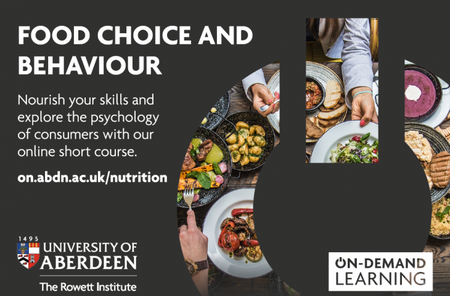When you go food shopping, do you have a list of items you need, or do you get attracted to the offers or reductions in-store? Or are you like me, doing your weekly shop online and usually stick to your favourite items. Although it is convenient to get my groceries delivered, I do miss wandering about looking at the range of items on offer and I really like to see what new products are available. Of course, as a registered UK nutritionist (Association for Nutrition, London) I am interested in food and I like to keep in touch with food innovation, as my job involves translating science onto the supermarket shelf. Although I am an academic researcher, I have a strong pull towards translation to influence the food we eat. This means I work with food sector colleagues; sometimes as a consultancy or as a joint-venture or contract research – always a positive experience to work as a part of a multi-disciplinary team to learn and share our experience and expertise.
A lot of my research in the early 2000’s was focussed on trying to develop dietary strategies to control hunger, as a way to assist with body weight control. For example, working with Marks & Spencer Plc to develop the health food range, Balanced for You. This was based on my research on high-protein diets, whereby there were more satiating and can assist dieters stick to their diet.
Developing new products or reformulating existing ones to be healthier embraces our ‘obeseogenic environment’ challenge, whereby our modern-day eating patterns have changed as we tend to snack more and have a plentiful supply of cheap and energy dense food. This in combination with low levels of activity make it easy to gain weight. I believe we can develop dietary strategies to tackle this problem, but we have a lot still to learn about the interaction between physiology and psychology of eating.
Research into food choice investigates how people select the food they eat. An interdisciplinary topic, food choice comprises psychological and sociological aspects (including food politics and phenomena such as vegetarianism), economic issues (for instance, how food prices or marketing campaigns influence choice) and sensory aspects (such as the study of the organoleptic qualities of food). I have been working on a new online course to share some of these learnings, particularly with food sector colleagues. Have a look at our new 4-week online course, and I would love to get your thoughts! I am on twitter as: @Dr_A_Johnstone



I am.international student who want to enroll in your prestigious school of nutrition
Hi Zainabu, we offer postgraduate programmes in Clinical Nutrition (online) and Human Nutrition as well as a range of nutrition related short courses, many of which can be studied online.
You can find out more information about our MSc programmes at www.abdn.ac.uk/study and our short courses can be found here www.on.abdn.ac.uk/nutrition